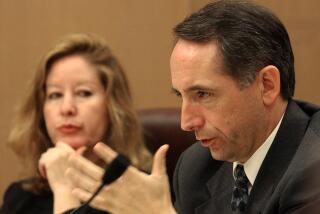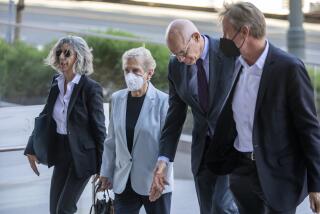Verdict Puts Ex-Auditor in a Tough Spot
- Share via
Neither government prosecutors nor David B. Duncan himself, the admitted scofflaw at Arthur Andersen who oversaw the auditing of Enron Corp., could have foreseen that jurors might not buy his testimony or his professed guilt.
Duncan, after all, was supposed to be the government’s star witness who would tell the inside story of how Andersen shredded documents related to its faulty audit of Enron in a desperate rush to destroy evidence of its own culpability.
But the jury rejected Duncan’s testimony and even rejected the argument that the shredding of Enron-related documents by Andersen employees was a crime. Instead, an in-house lawyer who has not been charged and who refused to testify was held up as the “corrupt persuader” who attempted to thwart a government investigation.
Now many are wondering whether Duncan, who is still facing a possible prison sentence but is cooperating with the Justice Department’s investigation of Enron’s collapse, was misguided or foolish to plead guilty in the first place.
At best, the only work the well-heeled accountant, who was paid about $700,000 in salary last year, will find is as a cut-rate corporate executive in the little leagues of American business, experts say.
Duncan, a father of three, is certain to lose his accounting license after sentencing, which is set for August. He is barred from making any profit by selling his story.
And although he copped a guilty plea in negotiations with federal prosecutors earlier this year, Duncan testified that he did not think he was doing anything wrong at the time he shredded documents last year.
“He may say to himself, ‘I made the wrong decision,’ ” said Leslie D. Corwin, a New York lawyer with Greenberg Traurig who represents national accounting firms, executives and partners. “Obviously the jury was very confused by him and his role.
“They didn’t find him to be the ‘corrupt persuader,’ and yet he pleaded guilty,” he said. “And he still faces jail. You can’t put a corporation in jail. Only people go to jail. To give up one’s rights and plead guilty is an awfully hard decision.... How can you not feel for Duncan on a personal level? But, for whatever reason with legal advice, he made a decision. He obviously had something to sell.”
Duncan’s attorney, Samuel Seymour, reached Sunday night, said his client was “totally comfortable with his testimony and the verdict, and he will continue his cooperation with the government.” Seymour, a lawyer with Sullivan & Cromwell in New York, declined further comment.
Duncan headed Andersen’s Enron team, whose work earned the firm about $1 million in weekly fees but which was viewed by some as perhaps too close to its clients. The team worked out of Enron’s headquarters, and its members, including Duncan, attended golf tournaments and went on ski trips with Enron executives.
After the document shredding came to light, Andersen executives made a splash by abruptly firing Duncan and announcing, “Andersen will not tolerate unethical behavior, gross errors in judgment or willful violation of our policies.”
But when Duncan testified for the government at Andersen’s trial, Rusty Hardin, the firm’s lead lawyer, cast him in a much kinder light. In a strange twist, that strategy appears both to have failed to clear the firm and to have helped convince at least some jurors that Duncan was not the bad egg.
“All of us disagreed on David Duncan,” said Jack Gallo, a juror who spoke at a news conference after the verdict was announced Saturday. “Some of us believed him, and some of us didn’t.”
Gallo added, without elaboration, that he believed Duncan had violated the law.
Jurors said they saw Duncan’s testimony about document shredding as a peripheral issue and did not incorporate it in their consideration of whether Andersen was guilty of obstruction of justice.
“All this business about telling people to shred documents, that was superficial and largely circumstantial,” foreman Oscar Criner said.
The jury didn’t find Duncan credible, raising questions about how other jurors might feel in future cases, should the government choose to put him on the stand again.
“It was just very clear that he had a lot of baggage that indicated he was capable of not telling the truth, particularly on his relations with Enron and with the people who were doing those funny deals,” Criner said.
The Andersen trial underscored that the government can go only so far with Duncan, said Laurie Levenson, a Loyola University constitutional law professor and a former federal prosecutor.
“He was damaged goods to start out with, and all they have now is confirmation that, yes, he is damaged goods,” she said. “How much will they use him? Only as much as they have to. But right now, it’s unclear who they have to take his place.”
Others said only time will tell how valuable Duncan could be to the ongoing investigation of Enron’s meltdown. Duncan’s sentencing is expected to be postponed for months, maybe even years, as investigators sort it out and build other cases.
“Duncan already basically sold his soul to the devil,” said Corwin, the New York partnership lawyer. Prosecutors “did it because they need him for the long run. I think part of his deal is, ‘I will plead to this, and I will cooperate with the government’--not only in the Andersen trial but also in the Enron trial. I think they are going to see the value of his cooperation for years to come.”
Duncan’s cooperation will exact a toll, Corwin said. “Who would hire him knowing this is someone who publicly is out there saying, ‘My job from 9 to 5 is working for the government of the United States now, sorting through Enron documents.’ His life is on hold now while this whole thing settles out. That in itself is a heavy burden.”
When Duncan does free himself from his legal obligations, the scandal will haunt him in his search for a new job, said Jeffrey Christian, founder of Christian & Timbers executive search firm and author of the forthcoming book “Headhunter’s Edge.”
“His career is over,” Christian said. “It’s going to be a very different world for him. Hopefully he has some money saved up.”
His best shot at finding employment would be as a chief financial officer, a position that does not require an accounting license, but large, publicly held companies probably would shy away from hiring him, Christian said.
“He will have to rely on the relationships he’s built with clients where he’s helped make them money,” he said. “He could go to work for a company where he is a bargain. He would have to represent a skill set that a company generally couldn’t afford, and they would see him as a valuable resource at rock-bottom prices.”
Harold J. Krent, dean of the Chicago-Kent College of Law and an expert on criminal law, said the beliefs of a few jurors in the Andersen trial doesn’t mean Duncan would have been exonerated had he been on trial.
“If it had been a trial against Duncan, the government would have had a different perspective, could have used other evidence, and it would have been a different jury,” Krent said.
“You always have to weigh the risks of greater penalty when you decide to plea. [Duncan] may be frustrated, but that’s our system. I don’t think he has reason to kick himself too hard.”
*
Times staff writer Jeff Leeds contributed to this report.
More to Read
Inside the business of entertainment
The Wide Shot brings you news, analysis and insights on everything from streaming wars to production — and what it all means for the future.
You may occasionally receive promotional content from the Los Angeles Times.











